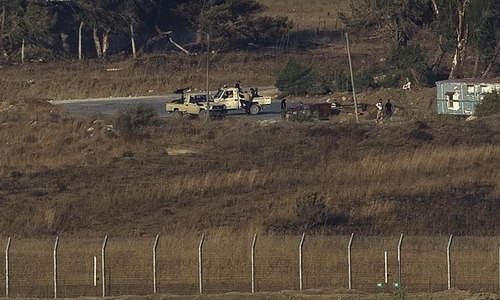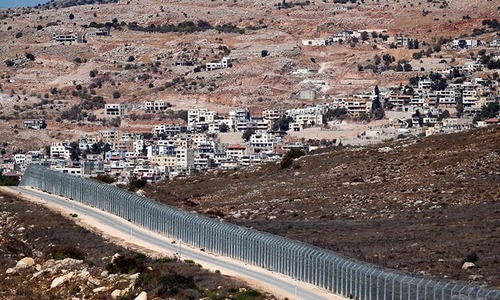UNITED NATIONS: The United Nations Security Council has scheduled to meet, at the request of Syria, over US President Donald Trump’s decision to recognise Israel’s sovereignty over the Golan Heights.
Israel captured the Golan Heights from Syria in the 1967 Middle East war and annexed it in 1981 in a move the UN Security Council declared “null and void and without international legal effect”.
In a letter to the 15-member Security Council requesting a meeting, Syria described the US decision as a “flagrant violation” of Security Council resolutions.
Trump, with Israeli Prime Minister Benjamin Netanyahu looking over his shoulder during a visit to Washington, on Monday signed a proclamation officially granting US recognition of the Golan Heights as Israeli territory.
The Security Council deployed a peacekeeping force in 1974 — known as the UN Disengagement Observer Force (UNDOF) — to monitor a ceasefire between Syria and Israel in the Golan Heights. There are more than 880 UN troops on the ground.
The US move on the Golan has left fractious Arab nations scrambling for a united response to a decision taken by a key ally, analysts said.
Angry reactions have poured in from Arab capitals. But the seemingly united front is only a veneer masking the deep dilemma for Arab governments left trying to deal with Washington’s “fait accompli”, analysts said.
Those Arab states who are “allies of the United States are the most embarrassed because they have gone to great lengths to get closer to Donald Trump”, said Karim Bitar, senior fellow at the Institute for International and Strategic Affairs.
Some Arab countries such as Saudi Arabia have been cosying up to Washington, hoping to influence a long-awaited Middle East peace plan due to be presented in the coming months.
But with the Trump administration shredding long-accepted regional conventions, Arab allies are left in an increasingly humiliating position.
Move may boost Iran
“It is rather Iran and its allies who feel comfortable in the idea that nothing can be expected from this American administration,” added Bitar.
Indeed Iranian President Hassan Rouhani on Tuesday denounced Trump’s move as tantamount to “colonialism” something that is “unprecedented in the present century”.
With Arab states long fractured, Tehran has increasingly sought to spread its influence in the region. While most Arab governments have shunned Syrian President Bashar al-Assad over the country’s devastating civil war, Tehran has been a steadfast ally helping the regime now gain the upper hand as the conflict enters its ninth year.
And in Yemen it is supporting Houthi rebels fighting a Saudi-led military coalition which is backing the country’s beleaguered government.
Trump’s decision could be seen as a “God-send” for Iran which will “try to capitalise on the US-Israeli move to try to fill the void of official Arab leadership” in the region, said Fawaz Gerges, an international relations expert at the London School of Economics.
Arab governments including Saudi Arabia, Iraq, Kuwait, Jordan and Lebanon have all condemned the US move. But while they have been left fuming by Trump’s casual short-circuiting of the accepted precepts of a future Middle East peace, they are powerless to take any meaningful action.
“Official Arab condemnation does not carry much weight. The Arab state system is dysfunctional and even broken,” said Gerges.
Arab countries, which have long fought for the Palestinian cause, “have been reduced to extreme fragility and none of them will go to war for Syria”, said political sociology professor Said Sadeq.
Saudi Arabia has even been quietly cooperating with Washington on the Israeli-Palestinian issue. Saudi Crown Prince Mohammed bin Salman “encouraged the Trump administration to think that core issues of international law and Arab sensitivity like Jerusalem and Syrian territory could be ridden roughshod over,” said Neil Partrick, Gulf specialist and author.
But the plan being drawn up by Trump’s son-in-law Jared Kushner appears unlikely to win much Arab approval.
Bitar slammed the Kushner plan as “smokescreen or a vast humbug” saying the recognition of the Golan serves as a “nail in the coffin” of this plan. “Trump’s decisions on Jerusalem and the Golan Heights ensure that Israel will be in a state of perpetual war with its Arab-speaking people neighbours,” added Gerges.
“The Israeli-Arab peace process is dead.”
Published in Dawn, March 28th, 2019














































